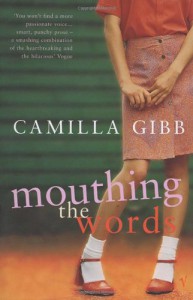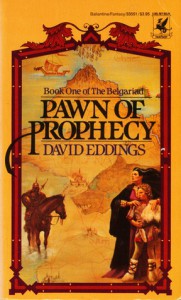Pemberley Shades (Pemberly Shades)
 i don't quite understand why this sequel has retained such a legendary status amongst austen fen. the writing isn't bad, but the story itself is predictable. and elizabeth calling darcy "fitz"? please. this edition definitely does a disservice to the author as it's riddled with errors -- missing or randomly inserted punctuation, as well as erroneous and extraneous words -- that made reading a less than enjoyable task.
i don't quite understand why this sequel has retained such a legendary status amongst austen fen. the writing isn't bad, but the story itself is predictable. and elizabeth calling darcy "fitz"? please. this edition definitely does a disservice to the author as it's riddled with errors -- missing or randomly inserted punctuation, as well as erroneous and extraneous words -- that made reading a less than enjoyable task.
Mouthing the Words
 apparently i read this in late 2002 or early 2003. i have absolutely no recollection of doing so. the book seemed entirely new to me. i think that bodes ill.
apparently i read this in late 2002 or early 2003. i have absolutely no recollection of doing so. the book seemed entirely new to me. i think that bodes ill.
Child-Free Zone: Why More People Are Choosing Not To Be Parents
 this is a rarity among books about the childfree in that it's written by and for australians. while it suffers a little from being self-published - in format and style (nothing a good editor couldn't fix) - it's remarkably comprehensive and well-researched. unfortunately the research and statistics are now a decade old, so a revised edition would be very welcome. overall it's a rational and refreshing book - particularly for those of us who are tired of being asked 'why' or being told how 'selfish' we are.
this is a rarity among books about the childfree in that it's written by and for australians. while it suffers a little from being self-published - in format and style (nothing a good editor couldn't fix) - it's remarkably comprehensive and well-researched. unfortunately the research and statistics are now a decade old, so a revised edition would be very welcome. overall it's a rational and refreshing book - particularly for those of us who are tired of being asked 'why' or being told how 'selfish' we are.
Beyond Motherhood: Choosing a Life Without Children
 i couldn't get past chapter two. the introduction made me very uncomfortable, but i thought i should stick with it. the author's emphasis on psychoanalysis and, particularly, the idea that women who choose to be childfree (and the fact that she refuses to use that term) do so because of a problematic relationship with their own mothers, is like some sort of intentional naivete. i'm also disturbed by her insistence that either the choice itself or the coming to terms with the choice is a difficult process that requires a woman find a new "outlet" for whatever "creative" energies she would otherwise have put toward motherhood; that she has to find a new way to be "womanly." WTF? of course, the book is entirely heteronormative.as it was published in 1996, i suppose the plight of the childfree woman was a bit different. but i find it insulting to be told that not only am i suffering a loss by choosing not to have a child, but also that i necessarily must come to terms with this "loss," possibly for the rest of my life. additionally, the way she romanticises the idea of a child - all the beneficent experiences one has by seeing things through a child's eyes; that the bonds of genetics are inherently stronger than the bonds we choose ourselves - belie all her childfree-positive words. she actually waxes lyrically over the sadness she feels at not having children to pass her collection of antiqiue kimonos to. dear god. listed among her "reasons to have a baby" taken from her journal when she was actively angsting over the decision are "a new kind of intimacy," "a sense of connection with life and with other women" and "regaining my own childhood." and people call the childfree selfish.perhaps women who are, indeed, struggling to decide whether or not they truly desire to be mothers will find this book useful. but as a woman who has long been emphatically and proudly childfree, i found it condescending and patronising.
i couldn't get past chapter two. the introduction made me very uncomfortable, but i thought i should stick with it. the author's emphasis on psychoanalysis and, particularly, the idea that women who choose to be childfree (and the fact that she refuses to use that term) do so because of a problematic relationship with their own mothers, is like some sort of intentional naivete. i'm also disturbed by her insistence that either the choice itself or the coming to terms with the choice is a difficult process that requires a woman find a new "outlet" for whatever "creative" energies she would otherwise have put toward motherhood; that she has to find a new way to be "womanly." WTF? of course, the book is entirely heteronormative.as it was published in 1996, i suppose the plight of the childfree woman was a bit different. but i find it insulting to be told that not only am i suffering a loss by choosing not to have a child, but also that i necessarily must come to terms with this "loss," possibly for the rest of my life. additionally, the way she romanticises the idea of a child - all the beneficent experiences one has by seeing things through a child's eyes; that the bonds of genetics are inherently stronger than the bonds we choose ourselves - belie all her childfree-positive words. she actually waxes lyrically over the sadness she feels at not having children to pass her collection of antiqiue kimonos to. dear god. listed among her "reasons to have a baby" taken from her journal when she was actively angsting over the decision are "a new kind of intimacy," "a sense of connection with life and with other women" and "regaining my own childhood." and people call the childfree selfish.perhaps women who are, indeed, struggling to decide whether or not they truly desire to be mothers will find this book useful. but as a woman who has long been emphatically and proudly childfree, i found it condescending and patronising.
Baby Down Under (Harlequin: The Australians series)
 probably my favourite category romance. riley is a bit of a smug bastard, but a good man nonetheless. alexandra wears doc martens and glasses, and owns a second hand bookshop. be still my heart! poor ann charlton nearly had an apoplexy when she was told about the abominable title, though. and the cover! blech. one must not judge a book by its cover, though.
probably my favourite category romance. riley is a bit of a smug bastard, but a good man nonetheless. alexandra wears doc martens and glasses, and owns a second hand bookshop. be still my heart! poor ann charlton nearly had an apoplexy when she was told about the abominable title, though. and the cover! blech. one must not judge a book by its cover, though.
Imzadi (Star Trek: The Next Generation)
 my 15 year old self was madly in love with this book. troi/riker was my first media fandom. *feels nostalgic*
my 15 year old self was madly in love with this book. troi/riker was my first media fandom. *feels nostalgic*












